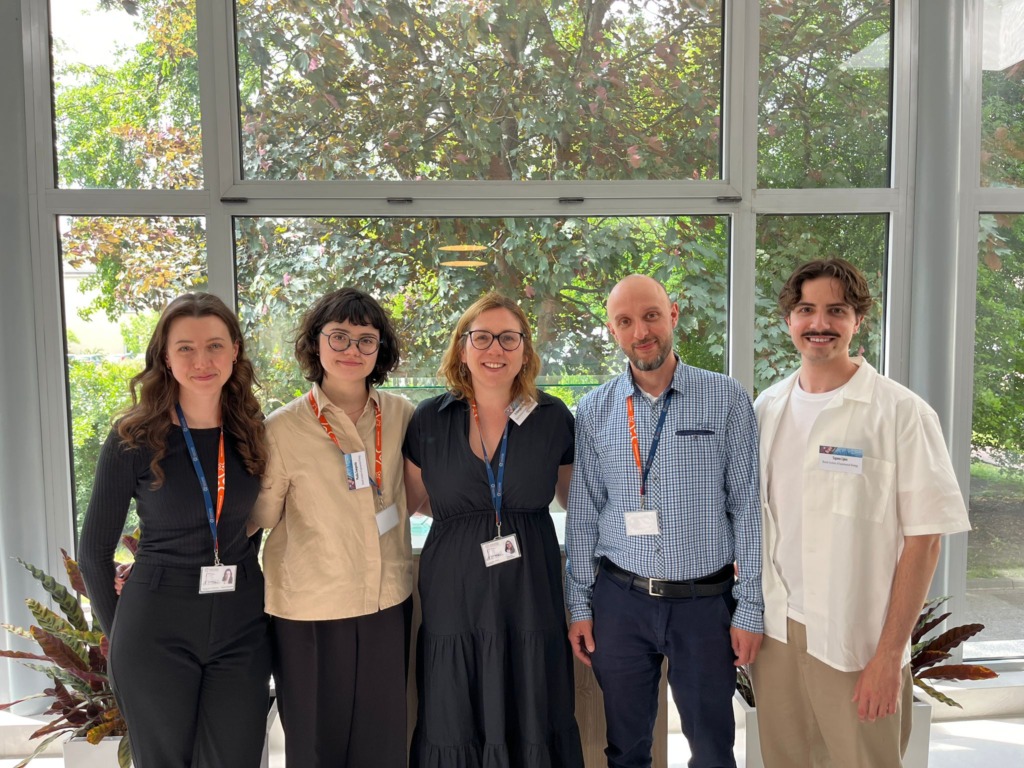- Head of laboratory
- Scientific Staff
- PhD Students
- Research Profile
- Current research activities
- Selected Publications
Head of laboratory

Research Profile
Dr Katarzyna Leszczyńska specialises in cancer biology and the mechanisms of resistance to radio- and chemotherapy caused by insufficient oxygen levels (hypoxia). In 2006 she obtained the MSc degree in biotechnology at the Wroclaw University of Technology. For the next 12 years she was acquiring scientific experience in the UK (2006-2018), where in 2011 at the University of Birmingham she obtained the PhD degree in the topic of pathological tumour angiogenesis. Subsequently, she undertook two post-doctoral fellowships at the University of Oxford, the first at the Sir William Dunn School of Pathology and the second at the Cancer Research UK/Medical Research Council Oxford Institute for Radiation Oncology at Department of Oncology, where she focused on the problem of tumour hypoxia which leads to therapy resistance. After her return to Poland in 2019 and joining the Laboratory of Molecular Neurobiology at the Nencki Institute, Kasia has developed her interests in the field of malignant paediatric high-grade gliomas and epigenetically-focused therapies. Her recent work on the role of H3K27M oncohistone in paediatric diffuse midline gliomas emphasizes the role of point histone mutations and epigenetic regulation of these diseases and significance in potential therapies. Kasia is a recipient of national and international grants funded by the National Science Centre and the European Union. In her independent Laboratory of Tumour Hypoxia and Epigenomics established in 2025, Kasia focuses on examining the relationship between hypoxia and epigenetic reprogramming of cancer cells and their microenvironment. Her ultimate goal is to discover new therapeutic approaches that can improve the effectiveness of radiotherapy and anti-cancer treatments.
Current research activities
Grants
2025-2030, SONATA-BIS14 (2024/54/E/NZ3/00480), Narodowe Centrum Nauki. PI of the grant. Project title: The H3K27M oncohistone-centred molecular mechanisms as therapeutic targets in pediatric malignant diffuse midline gliomas.
2023-2027, HORIZON-MISS-2023-CANCER-01 (no 101136835), Horizon Europe (European Health and Digital Executive Agency). Co-PI and co-coordinator of the consortium HIT-GLIO with Prof. Bożena Kamińska-Kaczmarek. Project title: HIT-GLIO: Targeting tumour-host interactions in paediatric malignant gliomas to reinvigorate immunity and improve radio- and immunotherapy efficacy. https://hit-glio.eu/
2020-2024, OPUS17 (2019/33/B/NZ1/01556), Narodowe Centrum Nauki. PI of the grant. Project title: Regulation of chromatin accessibility in the hypoxic tumour microenvironment of glioblastoma.
Selected Publications
Dzwigonska M, Rosa P, Lipiec S, Obrebski T, Smyk G, Kaza B, Cyranowski S, Ellert-Miklaszewska A, Kominek A, Malik AR, Piwocka K, Mieczkowski J, Kaminska B and Leszczynska KB, “Hypoxic stress dysregulates functions of glioma-associated myeloid cells through epigenomic and transcriptional programs”. Cell Rep. Vol 44, Issue 9, 116222, DOI: 10.1016/j.celrep.2025.116222, 2025
Tiwari V, Prajapati B, Asare Y, Damkou A, Ji H, Liu L, Naser N, Gouna G, Leszczynska KB, Mieczkowski J, Dichgans M, Wang Q, Kawaguchi R, Shi Z, Swarup V, Geschwind DH, Prinz M,Gokce O, Simons M. “Innate immune training restores pro-reparative myeloid functions to promote remyelination in the aged central nervous system”. Immunity 2024 Jul 19:S1074-7613(24)00348-0. doi: 10.1016/j.immuni.2024.07.001, 2024
Leszczynska KB*, Freitas-Huhtamäki A, Jayaprakash C, Dzwigonska M, Vitorino FNL, Horth C, Wojnicki K, Gielniewski B, Szadkowska P, Kaza B, Nazarian J, Ciolkowski MK, Trubicka J, Grajkowska W, Garcia BA, Majewski J, Kaminska B, Mieczkowski J*. “H2A.Z histone variants facilitate HDACi-dependent removal of H3.3K27M mutant protein in pediatric high-grade glioma cells.” Cell Rep. 43(2):113707, *corresponding authors, 2024
Leszczynska KB*, Dzwigonska M, Estephan H, Moehlenbrink J, Bowler J, Giaccia AJ, Mieczkowski J, Kaminska B and Hammond EM*. “Hypoxia-mediated regulation of DDX5 through decreased chromatin accessibility and post-translational targeting restricts R-loop accumulation”. Molecular Oncology, 17(7):1173-1191, *corresponding authors, 2023
Leszczynska KB*, Jayaprakash C, Kaminska B and Mieczkowski J*. “Emerging advances in combinatorial treatments of epigenetically-altered pediatric high-grade H3K27M gliomas”. Frontiers in Genetics, https://doi.org/10.3389/fgene.2021.742561, *corresponding authors, 2021
Ramachandran S, Ma TS, Griffin J, Ng N, Foskolou IP, Hwang MS, Victori P, Cheng WC, Buffa FM, Leszczynska KB, El-Khamisy SF, Gromak M & Hammond EM „Hypoxia-induced SETX links replication stress with the unfolded protein response.” Nature Communications. Jun 17;12(1):3686, 2021
Foskolou IP, Jorgensen C, Leszczynska KB, Olcina MM, Tarhonskaya H, Haisma B, D’Angiolella VD, Myers WK, Domene C, Flashman E and Hammnd EM. “Ribonucleotide reductase requires subunit switching in hypoxia to maintain DNA replication”. Mol Cell. 66(2):206-220.e9, 2017
Leszczynska KB, Dobrynin G, Leslie RE, Ient J, Boumelha AJ, Senra JM, Hawkins MA, Maughan T, Mukherjee S and Hammond EM. “Preclinical testing of an ATR inhibitor demonstrates improved response to standard therapies for esophageal cancer”. Radiother Oncol. 121(2):232-238, 2016
Olcina MM, Leszczynska KB, Senra JM, Isa NF, Harada H and Hammond EM. “Increased H3K9me3 facilitates p53-dependent apoptosis through repression of APAK in hypoxia”. Oncogene, 35(6):793-9, 2016
Leszczynska KB, Foskolou I, Abraham AG, Anbalagan S, Tellier C, Haider S, Span PN, O’Neill E, Buffa FM and Hammond EM. “Hypoxia-induced p53 modulates both apoptosis and radiosensitivity via AKT”. J Clin Invest. 125(6):2385-98, 2015

